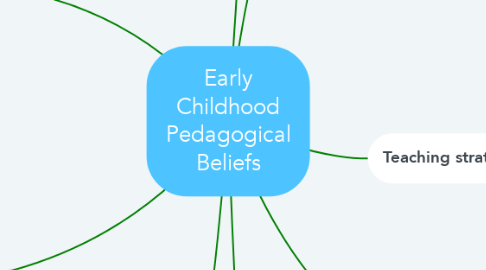Early Childhood Pedagogical Beliefs
by Tash Calautti


1. Child view
1.1. Active participants
1.2. Decision Makers
1.3. Have a diverse range of prior knowledge, interests and backgrounds
1.4. Child Agency
1.4.1. Environments
1.4.2. Planning
1.4.3. Choice
2. Play Based
2.1. Hands on learning
2.2. Problem Solving
2.3. Critical Thinking
2.4. Educators Role
2.5. Shared Sustained Thinking and Co-Construction of Knowledge
2.5.1. Vygotsky
2.6. Express themselves through the 100 languages
2.7. Inclusion of all children
3. Interactions
3.1. Nurturing relationships with families and communities
3.2. Understanding the impact positive relationships have when educators work with families
3.3. Continuity for learning
3.3.1. Transitions
3.4. Collaboration with colleagues when planning
3.4.1. Inviting parents to be a part of he panning process
3.5. Partnerships
3.5.1. Communication
4. Knowledge
4.1. Theories
4.1.1. Vygotsky
4.1.1.1. Bronfenbrenner
4.1.1.1.1. Maslow
4.2. Curriculum
4.3. Educator Professional Judgement
4.3.1. Creativity and imagination in planing
4.3.1.1. decision making
4.3.2. Intuition
4.4. Ongoing learning
4.5. Research
4.5.1. Challenge views
4.5.1.1. Support Change
5. Environments
5.1. Third Teacher
5.2. Interesting materials to provoke curiosity
5.3. Warm and Welcoming Spaces
5.4. Reflect culturally diverse learners
5.5. Reflect the families and lives of the children within care.
5.6. Indoor and Outdoor spaces
6. Teaching strategies
6.1. Respect for diversity
6.1.1. Cultural competencies
6.2. Intentional, purposeful and deliberate use of planning and of 'incidental' teachable moments
6.3. Reflective practice
6.3.1. Planning, teaching and assessment cycle
6.4. Holistic development
6.4.1. Physical
6.4.1.1. Social
6.4.1.1.1. Emotional
6.5. Assessment
6.5.1. Authentic
6.5.1.1. rich and meaningful
6.5.1.1.1. purposeful
6.6. Uses a range of strategies for all learners
6.7. Inspiring and motivating
7. Philosophy
7.1. Reggio Emilia Approach
7.2. Project Based Learning Approach
8. Documentation, Policies and Regulations
8.1. NQS
8.2. ELYF
8.2.1. Being
8.2.1.1. Belonging
8.2.1.1.1. Becoming

